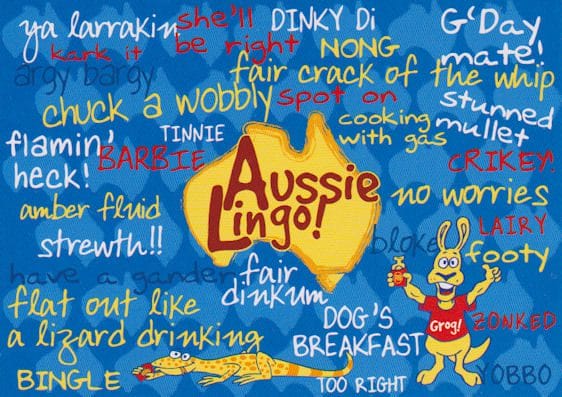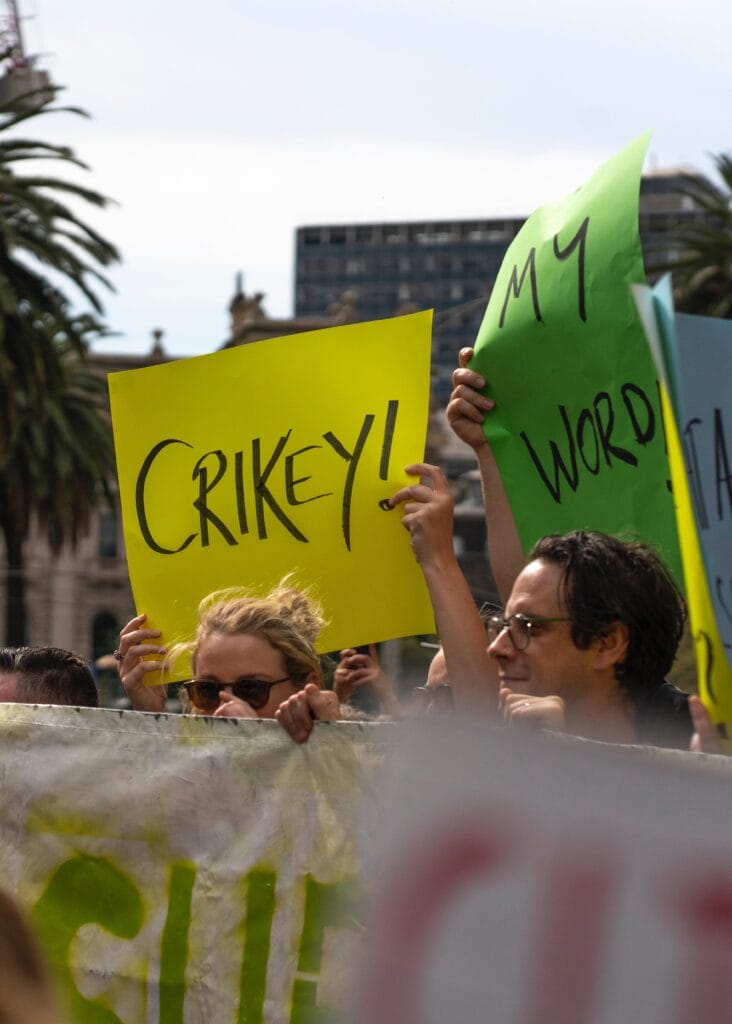A Guide to Australian Slang
The Foundation Skills for Your Future (FSFYF) Program ended in June 2024. Workplace-Based Training Projects are now available through the Skills For Education and Employment (SEE) Program.
Moving to a new country can present various challenges, even if you can speak and understand the language. Australia, having its own “special” version of the English language, means mastering some Australian slang will make day-to-day conversations easier.
With a little help from this guide, we aim to clarify some of the most frequently used Australian slang words and phrases in everyday life. With this knowledge, speaking ‘Aussie’ or Australian slang should be easy in no time.

Please enjoy our amusing A-Z list of slang terms, phrases and words commonly used in everyday life and workplaces. Learning them can be a fun and an exciting way to immerse yourself in the Australian culture.
A bit dodgy: Another way of saying “a bit suspicious” or “not very good”. For example, “That pizza tasted a bit dodgy, I think the cheese was off.”
Ankle biter: Another word for “child”. For example, “Let’s hurry because I need to pick up my little ankle biter from kindy.”
Arvo: Short for “afternoon”. For example, “I’ll see you this arvo.”
Barbie/BBQ: Short for “barbecue.” Aussies love a good barbie, especially during the summer months and during public holidays (link) where they can gather with friends and family and cook meat, or their preferred meal over a hot grill.
Brekkie: Short for “breakfast”. For example, “Let’s grab some brekkie before we start work tomorrow.”
Buggered/Cactus: Another word for “tired”. For example, “My legs are cactus after walking all that way.”
Check-out: The place in the supermarket where you scan your groceries and then pay for it. For example, “I’m open to serve you at this check-out now.
Chockers: A slang term for “full” or “packed”. For example, “The stadium was chockers during the grand final.”
Chrissie: Short for “Christmas”. For example, “What are you doing for Chrissie this year?”
Cold one: Another word for “beer”.
Coppers: Another word for “police”. For example, “Don’t let the coppers see you holding your phone while you’re driving the car, or you’ll get fined.”
Crikey: An expression of surprise. For example, “Crikey, that’s a big spider!”

Cuppa: Short way of saying cup of tea or coffee. For example, “Do you want a cuppa?”
Doc/GP: Short for Doctor/General Practitioner, various people use different terms for visiting the doctor. For example, “Can you show me a medical certificate from your GP please?’
Dunny: Another word for toilet. For example, “I’ve been sitting in traffic for an hour, I need to go to the dunny.”
Esky: Another word for a cool box or cooler, a portable insulated container used for keeping food and drinks cold. For example, “Grab yourself a drink from the esky.”
Fair dinkum: A phrase used to express honesty or authenticity. For example, “He’s a fair dinkum guy, always willing to help others when they need it!”
G’day: This is a common Australian greeting that means “hello” or “good day”. For example, “G’day, welcome to Gadigal country.”
Going for a dip: Another way of saying “going for a swim”. For example, “I’m going for a dip in the pool.”
Grab a feed: A phrase used to say let us get something to eat. For example, “I’m hungry, let’s grab a feed.”
How ya goin’? / Howzit goin’?: Another way of saying “How are you?”. For example, “How ya goin’, Mohammad?”
Knock off: To finish work or end the workday. For example, if someone says, “I’m knocking off at 5 pm”, it means they will be finishing work at 5pm.
Mate: A way of referring to another person, or friend. For example, “Thanks for coming today, mate.”
No worries: A commonly used phrase that means “you’re welcome” or “it’s okay”.
Ripper: A slang term for “fantastic” or “great”. For example, “That was a ripper game of soccer!”
See ya: Another way to say “goodbye”. For example, “See ya at work tomorrow, Manju.”
Servo: Short for “service station” where you get petrol for the car. For example, “I need to fill up the car at the servo.”
She’ll be right/sweet as/no drama: Another way of saying “Everything is good”. For example, “No dramas on picking you up for work Li, she’ll be right, I’ll drop you home too.”
Sickie: A sick day taken off work due to illness. For example, “I’ve got the flu and need to take a sickie today.” They may also say “chucking a sickie” which also means taking a sick day.
Smoko: Commonly heard in workplaces, meaning a short work break (not necessarily to smoke). For example, “I’m taking a quick smoko.”
Snag: Another word for meat or vegetarian– sausages. For example, “Let’s cook the snags on the barbie.”
Stickybeak: A term for a nosy person or if you’re going to have a look at something. For example, “Stickybeak Glenda can’t help but look out through her curtains when we are out the front of our house.”
Swimmers/togs/cozzie/bathers/budgie smugglers: Other words used for swimming costumes worn at the beach or swimming pool.
Ta: Another way of saying “Thank you.” For example, “Ta for that Steve, I’ll pay you back next week.” Also, “Ta” can mean goodbye. For example, “Ta-ta, see you later.”
Tea: Sometimes referred to as the meal dinner, not the drink. For example, “Come round after work for tea with me.”
Thongs: A type of summer footwear that are commonly referred to as “flip flops” or sandals in other countries. For example, “Grab your thongs and let’s swim at the beach.”
Ute: Short for “utility vehicle”. Like a pickup truck in the United States or SUV in Europe. For example, “I need to fill my ute up with fuel.”
Yeah, nah: Another way of expressing uncertainty or disagreement. For example, “Yeah, nah that doesn’t sound right me Jan.”
Yewy: A U-turn when driving. For example, “I need to do a yewy because I missed the turn.”

This is just a small sample of Australian slang words and phrases used in everyday life. Most importantly, don’t be afraid to ask if you don’t understand a word or phrase. The more you practise using Aussie slang, the easier it will become to use in everyday life.
Contact Navitas Skilled Futures to enrol in the Adult Migrant Program (AMEP), which gives migrants and refugees the opportunity to improve their language and digital skills to live their best life in Australia.
Migrating to Australia can be a life-changing yet rewarding experience, and Navitas Skilled Futures is here to help you along the way.
Get in touch if you are interested in studying with us.

